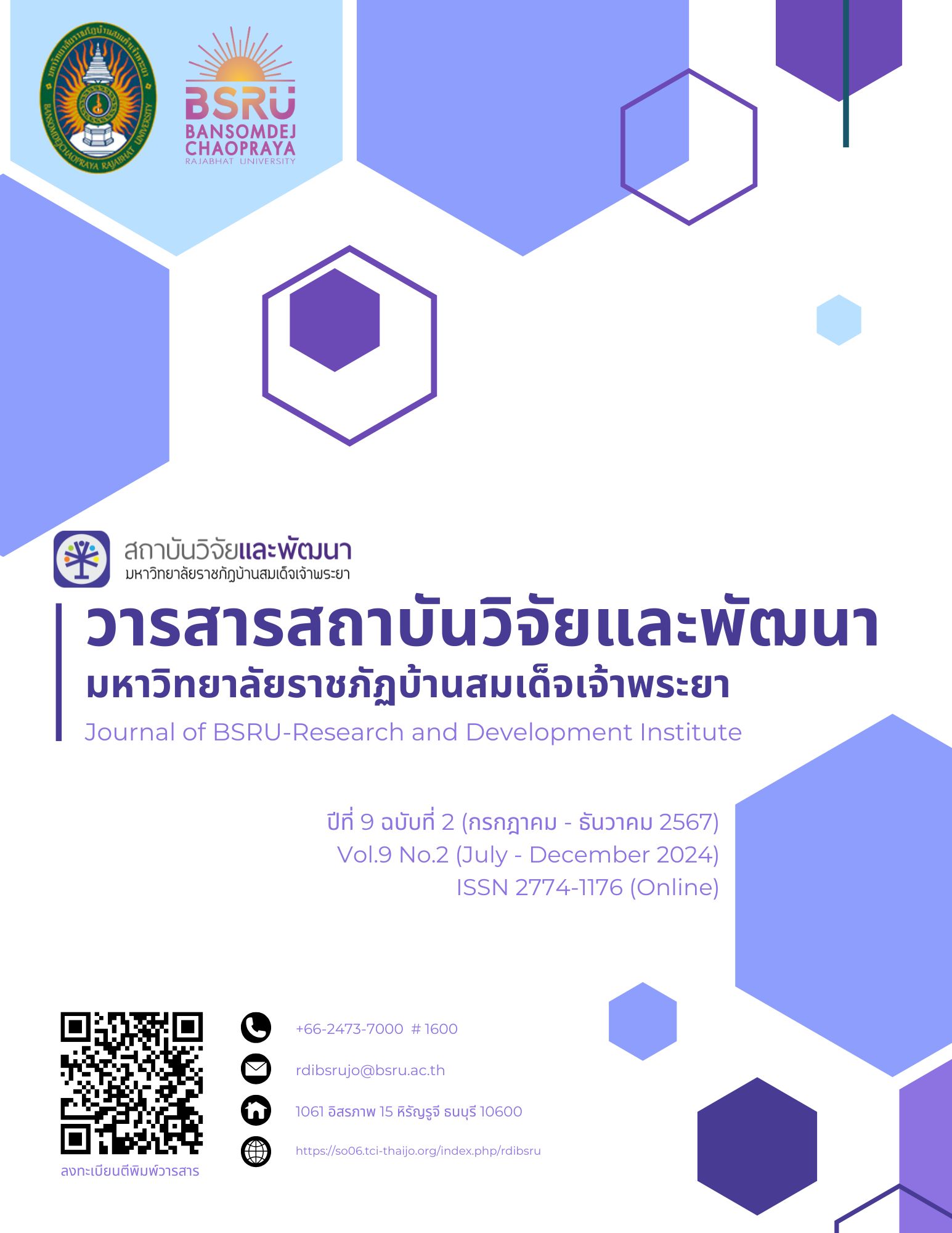รูปแบบการจัดการเรียนรู้ออนไลน์ที่มีประสิทธิภาพด้วยกระบวนการเรียนรู้เชิงรุก เพื่อส่งเสริมความสามารถในการจัดการความรู้ของนักศึกษาปริญญาตรี
คำสำคัญ:
รูปแบบการจัดการเรียนรู้ออนไลน์, กระบวนการเรียนรู้เชิงรุก, ความสามารถในการจัดการความรู้บทคัดย่อ
การวิจัยนี้มีวัตถุประสงค์เพื่อทดลองใช้และรับรองรูปแบบการจัดการเรียนรู้ออนไลน์ด้วยกระบวนการเรียนรู้เชิงรุกที่ส่งเสริมความสามารถในการจัดการความรู้ของนักศึกษาระดับปริญญาตรี กลุ่มทดลอง คือ นักศึกษาระดับปริญญาตรี มหาวิทยาลัยราชภัฏบ้านสมเด็จเจ้าพระยา ที่ลงทะเบียนเรียนรายวิชาการออกแบบสารสนเทศเพื่อการนำเสนอ ในภาคเรียนที่ 2 ปีการศึกษา 2565 จำนวน 30 คน คัดเลือกด้วยวิธีสุ่มอย่างง่าย การวิเคราะห์ข้อมูลใช้ค่าเฉลี่ย ส่วนเบี่ยงเบนมาตรฐาน และการวิเคราะห์ความแปรปรวนแบบวัดซ้ำ กลุ่มรับรองรูปแบบ คือ ผู้ทรงคุณวุฒิ จำนวน 7 คน คัดเลือกกลุ่มตัวอย่างด้วยวิธีเฉพาะเจาะจง และใช้แบบประเมินและรับรองรูปแบบการจัดการเรียนรู้ เป็นเครื่องมือในการวิจัย สถิติที่ใช้ คือ ค่าเฉลี่ยและส่วนเบี่ยงเบนมาตรฐาน ผลการวิจัยสรุปได้ว่า (1) ผลการทดลองใช้รูปแบบการจัดการเรียนรู้ ด้วยการเปรียบเทียบความสามารถในการจัดการความรู้ 3 ครั้ง ของผู้เรียนกลุ่มทดลองที่เรียนด้วยรูปแบบดังกล่าวตลอดภาคเรียนที่ 2 ปีการศึกษา 2565 พบว่า ผู้เรียนมีความสามารถในการจัดการความรู้เพิ่มขึ้นอย่างมีนัยสำคัญทางสถิติที่ระดับ .05 และผู้เรียนพึงพอใจต่อรูปแบบการจัดการเรียนรู้ดังกล่าวในระดับความพึงพอใจมากที่สุด (2) ผลการรับรองรูปแบบพบว่า ในภาพรวมอยู่ในเกณฑ์ที่เหมาะสมมากที่สุด และผู้เชี่ยวชาญทุกท่านให้การรับรองรูปแบบการจัดการเรียนรู้ดังกล่าว จึงถือได้ว่ารูปแบบที่พัฒนาขึ้นมีความเหมาะสมและมีประสิทธิภาพที่จะนำไปประยุกต์ใช้ได้กับการเรียนรู้ในรายวิชาที่เหมาะสมต่อไป
Downloads
เอกสารอ้างอิง
เกียรติศักดิ์ พันธ์ลำเจียก. (2552). การจัดการความรู้ในการเรียนการสอนระดับบัณฑิตศึกษาสู่สังคม. งานวิจัยสำนักงานคณะกรรมการการวิจัยแห่งชาติ มหาวิทยาลัยเทคโนโลยีเทคโนโลยีราชมงคลธัญบุรี.
จุฑารัตน์ ศราวณะวงศ์. (2551). การสังเคราะห์งานวิจัยเกี่ยวกับปัจจัยความสําเร็จในการจัดการความรู้. วารสารวิจัยสมาคมห้องสมุด. 1(1), 35-49.
ธัชกร สุวรรณจรัส. (2553). การพัฒนารูปแบบการจัดการความรู้ด้วยการเรียนจากประสบการณ์บนเครือข่ายเพื่อส่งเสริมความสามารถในการสร้างนวัตกรรมทางการศึกาของครูสังกัดสำนักงานคณะกรรมการการศึกษาขั้นพื้นฐาน. [วิทยานิพนธ์ครุศาสตรดุษฎีบัณฑิต สาขาวิชาเทคโนโลยีและสื่อสารการศึกษา จุฬาลงกรณ์มหาวิทยาลัย].
เบญญาภา คงมาลัย. (2556). รูปแบบการพัฒนาสมรรถนะการจัดการความรู้ของนิสิตนักศึกษาระดับปริญญาบัณฑิต. [วิทยานิพนธ์ปริญญาดุษฎีบัณฑิต, จุฬาลงกรณ์มหาวิทยาลัย]. https://cuir.car.chula.ac.th/handle/123456789/42788
ประพนธ์ ผาสุกยืด. (2550). การจัดการความรู้ KM ขับเคลื่อน LO. (พิมพ์ครั้งที่ 3). ใยไหม.
พัชนี เดชประเสริฐ, จิราภรณ์ หนูสวัสดิ์, ฐัศแก้ว ศรีสด, และเอื้อมพร เธียรหิรัญ. (2561). การพัฒนารูปแบบการจัดการสิ่งแวดล้อมทางการเรียนรู้ที่ส่งเสริมความสามารถในการสืบค้นทางอินเทอร์เน็ตสำหรับนักศึกษาระดับอุดมศึกษา. วารสารก้าวทันโลกวิทยาศาสตร์. 18(20), 140-157.
พินิจ มีคำทอง. (2561). กูเกิ้ลแอปพลิเคชั่น : นวัตกรรมทางการศึกษาสำหรับครูยุคศตวรรษที่ 21. วารสารวิชาการและวิจัย มหาวิทยาลัยภาคตะวันออกเฉียงเหนือ. 8(3), 72-80.
รสมาริน ญาณบุญ. (2550). การใช้กิจกรรมการเรียนรู้ในห้องเรียนธรรมชาติเพื่อส่งเสริมการจัดการความรู้ของผู้เรียน. [รายงานการศึกษาค้นคว้าแบบอิสระปริญญามหาบัณฑิต, มหาวิทยาลัยเชียงใหม่]. http://cmuir.cmu.ac.th/jspui/handle/6653943832/12416
รัศมี ศรีนนท์ และคณะ. (2561). การจัดการเรียนรู้เชิงรุกในยุคไทแลนด์ 4.0. วารสารการบริหารการศึกษา มหาวิทยาลัยศิลปากร. 9(2), 331-342.
วิทยา วาโย, อภิรดี เจริญนุกูล, ฉัตรสุดา กานกายันต์ และจรรยา คนใหญ่. (2563). การเรียนการสอนแบบออนไลน์ภายใต้สถานการณ์แพร่ระบาดของไวรัส COVID-19 : แนวคิดและการประยุกต์ใช้จัดการเรียนการสอน. วารสารศูนย์อนามัยที่ 9. 14(34), 285-298.
สราญจิตร วงษ์ทองดี. (2551). การศึกษาพัฒนาการของความสามารถในการจัดการความรู้ในการเรียนวิชาคณิตศาสตร์ของนักเรียนช่วงชั้นที่ 3 สังกัดสำนักงานเขตพื้นที่การศึกษาสุพรรณบุรี เขต 1 ที่มีลักษณะความเป็นผู้นำแตกต่างกัน. [วิทยานิพนธ์ปริญญามหาบัณฑิต, มหาวิทยาลัยศรีนครินทรวิโรฒ ประสานมิตร].
อภิญญา หนูมี. (2566). การสร้างรูปแบบการจัดการเรียนรู้ออนไลน์ด้วยกระบวนการเรียนรู้เชิงรุกเพื่อส่งเสริมความสามารถในการจัดการความรู้ของนักศึกษาปริญญาตรี. วารสารสถาบันวิจัยและพัฒนา. 8(1), 144-159.
Rogers, E. M. (2003). Diffusion of innovations (5th ed.). The Free Press.
Sweller, J. (2006). The worked example effect and human cognition. Learning and Instruction. 16(2), 165–169. https://doi.org/10.1016/j.learninstruc.2006.02.005
ดาวน์โหลด
เผยแพร่แล้ว
ฉบับ
ประเภทบทความ
สัญญาอนุญาต

อนุญาตภายใต้เงื่อนไข Creative Commons Attribution-NonCommercial-NoDerivatives 4.0 International License.
บทความ ข้อความ ภาพประกอบ และตารางประกอบที่ลงพิมพ์ในวารสารเป็นความคิดเห็นส่วนตัวของผู้นิพนธ์ กองบรรณาธิการไม่จำเป็นต้องเห็นตามเสมอไป และไม่มีส่วนรับผิดชอบใดๆ ถือเป็นความรับผิดชอบของผู้นิพนธ์เพียงผู้เดียว






